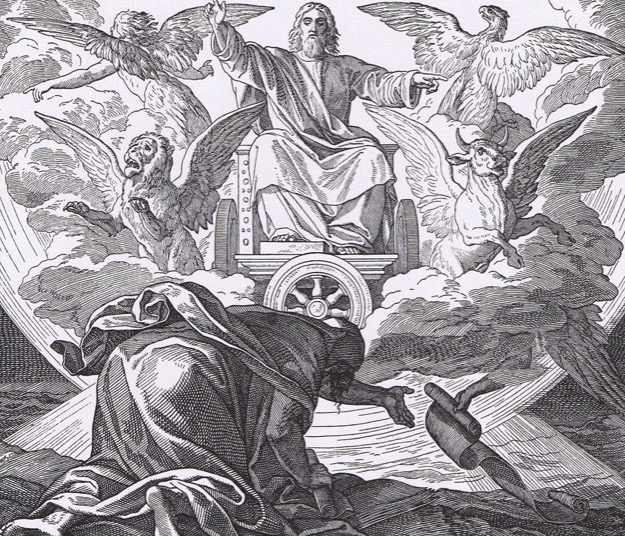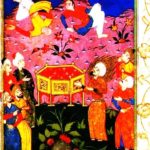The longest narration of Aisha probably presents a condensed version of events since the details conflict with other narratives. Nevertheless, we’ll pick up with it.
Khadija then accompanied him to (her cousin) Waraqa bin Naufal bin Asad bin `Abdul `Uzza bin Qusai. Waraqa was the son of her paternal uncle, i.e., her father’s brother, who during the Pre-Islamic Period became a Christian and used to write the Arabic writing and used to write of the Gospels in Arabic as much as Allah wished him to write. He was an old man and had lost his eyesight.
Khadija said to him, “O my cousin! Listen to the story of your nephew.” Waraqa asked, “O my nephew! What have you seen?”
The Prophet (ﷺ) described whatever he had seen.
Waraqa said, “This is the same Namus (i.e., Gabriel, the Angel who keeps the secrets) whom Allah had sent to Moses. I wish I were young and could live up to the time when your people would turn you out.”
Allah’s Messenger (ﷺ) asked, “Will they turn me out?” Waraqa replied in the affirmative and said: “Never did a man come with something similar to what you have brought but was treated with hostility. If I should remain alive till the day when you will be turned out then I would support you strongly.”
Sahih Bukhari 3
We actually need to stop before we go any farther and realize that the word usually translated as “Christian” from early Islamic sources is not, in fact, a correct Arabic word for “Christian.” It’s the Arabic word meaning “Nazarene.” This is still a word commonly applied to Christians today by Arabic speakers, but the reason for this usage has really only two possibilities: 1) It came from a heretical sect or, 2) it came from the Jewish term for Christians, which is a bit of a slur. That’s not to say that some Jewish converts wouldn’t call themselves “Nazarenes” even now, but this is already cluing us in that something weird is going on here–the “Christians” we find in the Islamic sources aren’t going to be the regular sort of Christians elsewhere.
We also see here clearly the mystical power that writing gives a person to the people who were relaying these narrations in the declaration that Waraqah used to “write of the Gospels in Arabic as much as Allah wished him to write.” Another narration from Bukhari say that Waraqa used to “read the Gospels in Arabic,” and another said that Waraqa used to “write the writing with Hebrew letters. He would write from the Gospel in Hebrew as much as Allah wished him to write.” Yet another said that “he used to write books in Arabic and, therefore, wrote Injil in Arabic as God willed that he should write.” (All of these narrations are credited to Aisha.)
In reality, there is no evidence that any gospel were available in Arabic at this time. There’s one significant late heretical book that really isn’t a gospel at all that was likely already in Arabic and probably partial translations and hymns circulating around as poetry, but we don’t have any evidence for an even partial actual gospel, real or heretical, in Arabic. So perhaps Waraqah could read Aramaic (“Hebrew letters”) and could write in Arabic, too, though whatever he wrote would be well and truly lost now.
Waraqah’s exact expertise is confused, and yet one thing is clear: his literacy is given very strong mystical trappings, being portrayed as coming under the direct authority and direction of a supernatural Power. The way his actions are portrayed are arguably that of some kind of prophetic delivery in itself. He is not shown as just copying but is writing “as much as Allah wished him to write.” This confusion is typical of Arab views of writing.
The Delivery of the Law
Now, the word “namus” is glossed as “Gabriel” in Bukhari. This is not in the text, but it seems to be the conventional Islamic interpretation of that occurrence of the word in all the sources, as it is usually glossed this way. Namus, however, means “custom” or “code of behavior,” not “angel” or anything like it.
Nomos is an Ancient Greek word meaning “law, custom.” It was the word used for the Law of Moses when this term was translated into Greek in the Septuagint as well as when it appears in the New Testament. From the Greek, it was borrowed into Aramaic as nimos. It appears in the Targum (meaning Aramaic paraphrase or interpretation) to the Song of Songs (c. 400-800) and also in Jewish medieval histories, where is was used to mean a code of law derived from a religious basis, not just for Jewish law but also for Islamic law and for Christian church law (which mostly affected marriage and divorce).
Borrowed in Arabic as namus and later via Arabic into Turkish, it became used specifically to refer to the virtue of the customary codes of female behavior–for example, it is the word translated as “honor” from the phrase “honor killings”–but it originally also had a much broader meaning of customary law, especially of religious origins.
Therefore, what Waraqah said was, in English, “This is the same code of law that Allah sent Moses.” I don’t disagree that Waraqah probably also told him that Muhammad that was being visited by an angel, but it this was not recorded in his words.
The other major sources are largely the same. Ibn Sa’d gives these variations:
Then she went to Waraqah Ibn Nawfal and it was the first time that she approached him and told him what the Apostle of Allah, may Allah bless him, had conveyed to her. Thereupon Waraqah said: “Verily, your uncle’s son is truthful and verily, this is the beginning of his prophethood and that the greatest Namus visits him. So, tell him that he should not think but good about himself.”
Ibn Sa’d
And also:
Then she approached Waraqah Ibn Nawfal and related (the incident) to him. He said: “If he is true, then he is nomos as in the case of Moses. If I am alive, when he is commissioned (to prophethood) I shall support him, help him and believe in him.”
Ibn Sa’d
These show Khadija to consult Waraqah going on her own. Ibn Ishaq puts both traditions together and smoothed out some of the conflicts, as he tended to do:
Then she rose and gathered her garments about her and set forth to her cousin Waraqa b. Naufal b. Asad b. ‘Abdu’l-Uzza b. Qusayy, who had become a Christian and read the scriptures and learned from those that follow the Torah and the Gospel.
And when she related to him what the apostle of God told her he had seen and heard, Waraqa cried, ‘Holy! Holy! Verily by Him in whose hand is Waraqa’s soul, if thou hast spoken to me the truth, O Khadija, there hath come unto him the greatest Namus (T. meaning Gabriel) who came to Moses afore-time, and lo, he is the prophet of this people. Bid him be of good heart.’
So Khadija returned to the apostle of God and told him what Waraqa had said. (T. and that calmed his fears somewhat.) And when the apostle of God had finished his period of seclusion and returned (to Mecca), in the
first place he performed the circumambulation of the Ka’ba, as was his
wont.While he was doing it, Waraqa met him and said, ‘O son of my
brother, tell me what thou hast seen and heard.’The apostle told him, and Waraqa said, ‘Surely, by Him in whose hand is Waraqa’s soul, thou art the prophet of this people. There hath come unto thee the greatest Namus, who came unto Moses. Thou wilt be called a liar, and they will use thee despitefully and cast thee out and fight against thee. Verily, if I live to see that day, I will help God in such wise as He knoweth.’ Then he brought his head near to him and kissed his forehead; and the apostle went to his own house.
Ibn Ishaq
In every version, then, Waraqah actually says the same thing: You are being chosen to receive the Law of Moses from Allah. (The awkwardness of swapping out “law” with “namus” here is entirely due to choices made by translators and isn’t in the original text.) There is nothing in here about any angel! Cramming in Jibril was a later interpretation–perhaps the word namus was still relatively obscure at the time, and the earliest scholars, not knowing what it meant, glossed it that way before the word became widely used, in order to be consistent with the tradition that Waraqah told Muhammad he was being visited by an angel. (I know that Tabari is one source for this gloss, so it’s very early.)
It’s likely that the scholars didn’t know why Waraqah would think that Muhammad was a prophet like Moses except for the presence of a Power interpreted as an angel. But, of course, angels came to all sorts of people for all sorts of reasons. They came to poor shepherds to announce the birth of Jesus Christ. So either this is just a weird, messy, nonsensical story, or else there is something that reminded Waraqah specifically of Moses. Modern Islamic apologists imagine that Waraqah knew of Deuteronomy 18 and thought that meant Muhammad–but that interpretation is simply impossible.
But there is something else that reminded Waraqah specifically of Moses, and it’s something Islamic scholars don’t know because they don’t actually know the Torah as well as a small Christian child who goes to Sunday School.
When the Creator God spoke to Moses out of the bush, we read this in the Torah:
Then Moses said to God, “If I come to the people of Israel and say to them, ‘The God of your fathers has sent me to you,’ and they ask me, ‘What is his name?’ what shall I say to them?” God said to Moses, “I am who I am.” And he said, “Say this to the people of Israel: ‘I am has sent me to you.’” God also said to Moses, “Say this to the people of Israel: ‘The Lord, the God of your fathers, the God of Abraham, the God of Isaac, and the God of Jacob, has sent me to you.’ This is my name forever, and thus I am to be remembered throughout all generations.
Exodous 3:13-15
God gives three answers: “I am who/that I am”; “I am”; and “Yahweh” which would have been written as “Lord” in Syriac, Hebrew, Aramaic, or Arabic, just as it is in English.
Let’s go back to Surah 96 once again:
- Read! in the name of your Lord, He-Who-Created–
- He created man from a blood-clot:
- Read! And your Lord is the most generous,–
- He Who taught by (the use of) the pen,–
- Taught man that which he knew not.
Waraqah would have known that the God who created man was, of course, the God of the Christians and Jews. Waraqah was educated enough to catch that the Power was introducing himself by name in the same was that Yahweh did, but he wasn’t educated enough to know that He-Who-Created is not a decent approximation for I-Am-That-I-Am. And because Waraqah was a heretical mystic, seeking hidden knowledge, all the other warning signs also went right over his head. He immediately connected Moses and the burning bush to Muhammad in the cave.
How Could Muhammad Get Jesus’ Name Wrong?
There is a lot of debate about who Waraqah was, what he believed, and how much influence he could have possibly had over Muhammad. When it comes to Muhammad and the Christian scriptures, we have two different and highly contradictory discoveries.
First, Muhammad really had no exposure whatsoever to orthodox Christology–he did not even know what the Trinity meant, for example. He had no knowledge of anything that was said specifically about or by Jesus in the four Gospels, he doesn’t know that Jesus didn’t write the Gospels, and he doesn’t even know that four Gospels exist–he thought there was only one. When there is a reference to any part of the life of Jesus in the Quran, it inevitably comes from folklore or heretical works produced after AD 300. And, most significantly, the Quran consistently gets Jesus’ name wrong, calling him Isa or Esau instead of Yesa’, which is what every Arab Christian used.
It’s easy to say, then, that Waraqah couldn’t have been any kind of Christian at all. However, Muhammad knew very early, with very clear precision, certain eschatological passages in the Gospels, showing exposure to fragments of a harmonized gospel of Matthew and Luke or something derivative of a harmonized gospel. That couldn’t have come out of nowhere.
Early in the history of Christianity, by the mid second century AD, people were producing translations not just of the three synoptic Gospels (Matthew, Mark, and Luke) but were actually putting them together into a new, single work when translating. We call these “harmonized gospels,” and they’re still produced today to help people in worship. The goal was often not nefarious: people couldn’t all have their own copy of the Bible because even the writing material was very expensive, let alone the cost of labor when producing written work, so people were mostly exposed to the Bible through oral readings at church. By putting the gospels together, every nuance from a certain event might be better captured without having to read multiple passages. It also meant a cheaper book–one book, fewer pages, fewer words, and so far cheaper to reproduce. Even now, there are harmonized gospels produced for private worship. Very early Christians were comfortable using harmonized Gospels or paraphrase translations.
However, when a harmonized gospel was produced, the original intent of the inspired authors could easily be altered. Small changes in words could change meaning significantly. But what really got the Church’s attention is that some people producing these works were clearly bad actors who deliberately, significantly changed the Gospels to say what they’d rather it say. Because of all these issues, the Church discouraged harmonization for a while (when people could conceivably be led astray by them) and banned it for liturgical (official) use, and there was a big push to give churches that only had harmonizations a copy of the four original Gospels to use instead. When the harmonizations were traded in, they were taken up and stored, not deliberately destroyed, but unfortunately, central storage is not a good way to save things for 1500 years, and not many of the harmonizations have survived in more than very fragmentary form.
Ground zero for harmonizations was Syria, and among those that were produced were some that were highly heretical. The Gospel of the Ebionites, as it is now general called, has survived only in fragments, and these fragments show the extreme editorial revision that the Aramaic harmonization took.
The Ebionites were not Christian at all, or at least, they were Christian no longer, as their sect seemed to devolve from a core of Judaizing Christians who sought increasingly to be more and more Jewish until they left Christianity behind entirely. They arrived at the belief that Jesus was a great prophet in the line of Moses and no more than that. He had come to do away with animal sacrifices and to tell people to be virtuous. The Ebionites kept the full Jewish law, including circumcision, and they kept the Sabbath and also celebrated Jesus’ resurrection on Sundays. They took the Gospels (primarily Matthew, according to Eusebius) and altered them significantly to produce their own heretical harmonization promoting their heretical doctrine. From this abolition of sacrifice came the promotion of vegetarianism, so one of the odder features is the transformation of Jesus, John the Baptist, and the disciples into vegetarian animal rights activists. John eats cakes instead of locusts (a small alteration of the Greek for a huge change in the Aramaic), Jesus rants against animal sacrifice, and Jesus gives a speech about why he won’t eat the Passover lamb. This was a way for Jews to make sense of the destruction of the Temple, as predicted by Jesus, while still remaining Jews–Jesus’ job, according to them, was to tell people to stop sacrificing, and when they didn’t, God destroyed the Temple. Jesus’ resurrection was a sign of God’s approval of him in the way that Elijah was taken to heaven at the end of his earthly work, no more and no less. The Jews, then, were still in God’s good graces to keep doing pretty much everything that they were doing, plus be vegetarian.
Muhammad’s knowledge of Christianity could fit into the Ebionite heresy in some ways, particularly the denial of the divinity of Jesus Christ and the knowledge of only one Gospel that would affirm that denial–but the Christology of Muhammad differed in drastic ways from the Ebionite beliefs. First, Islam affirms that Jesus was born of a virgin; almost all of the Ebionites by this time rejected it. Early Islam seems aware of many of the Jewish dietary restrictions but knows nothing about vegetarianism being associated with Jesus-followers. In fact, Islam rejects most of the Mosaic dietary laws, calling it a punishment given to Jews for not listening to Jesus, which means that Muhammad thought of Christians as not following Jewish laws. Congruent with Ebionism, Islam doesn’t seem aware that Christians didn’t practice circumcision, but Islam also isn’t aware that women are not circumcised even in Judaism.
The Ebionites were considered related to a sect called the Nazarenes–which may be significant since the Christians are called Nazarenes in early Islamic texts. However, the term “Nazarene” could mean nothing more than that early in Christianity, the Nazarenes were just another name for Christians–Christians got their name in Antioch, and Nazarenes got their name in the Levant. It was a Jewish name, and so it applied mainly to Jewish Christians. The name Nazarene has continued to be preferred by Jews in Hebrew because they want to reject that Jesus was the Messiah–that is, the Christ, in the Greek–but at first, it was a neutral term. Jewish converts who insisted that others must keep the whole of the Mosaic law (called the Judaizers in Christian sources) were eventually cast out from the main body of Christianity, and so the name Nazarene in Christian use came to be associated only with them. The Nazarenes obviously rejected Paul and all of the epistle-writers and used only an Aramaic version of the Book of Matthew, according to the early Church Fathers, but they otherwise seem to have conformed to orthodox beliefs about the virgin birth, divinity, crucifixion, and resurrection of Christ. So they didn’t seem to have contributed that much to Muhammad’s understanding of who Jesus was or what Christians did, beyond their name.
There is one more sect that was kicking around Syria at this time that might account for the name “Nazarene” (but probably not) and that is the Mandaens. They are an actual honest-to-goodness Gnostic sect who have a mishmash of Jewish, Christian, and Zoroastrian beliefs that are infused into a Gnostic framework. They now revere John the Baptist rather than Jesus, and it’s believed that they actually predate both the development of Gnosticism and Jesus’s life in some early mystical form and merely grafted these onto their existing syncretic framework over time. Why do I mention them? Well, they were called Nasoraeans, which is not actually related to the word Nazarene but is similar enough (naṣārā vs naṣuraiia) that it could be easily confused. Late, heretical Christian Gnostic works were certainly kicking around Syria at this time, and some of them found their way into the Quran, but the modern beliefs of the Mandaeans really seem to be not any basis for Islam’s view of Jesus, so this possibility is really remote.
The idea that Waraqah was “a Nestorian monk” is a peculiar one that is based on nothing more than the fact that Nestorians lived in Syria. Literally nothing that Muhammad thought about Christianity is compatible with Nestorianism.
In the end, there is no sect of Christianity, however heretical, that fits either what Muhammad presents as the truth about Jesus or what Muhammad obviously thought that Christians believed. One of the weirdest aspects of the Islamic view of Jesus is that the name used for Jesus is Isa–that is, Esau. The Quran and all Islamic sources literally get Jesus’s name wrong, every single time. The English name Jesus comes through Latin and Greek from the Aramaic name Yeshua, which in tern comes from the Hebrew Yehoshua. The equivalent name in Arabic is Yesu’ or Yaso’, and that’s what any Arabic Christian back then, as now, would have used. Jews frequently used various alternatives and slurs to refer to Jesus instead of saying Yeshua, and Esau fits that denigrating pattern. But no actual Christian would have ever used that name.
If Waraqah was a Christian by any reasonable definition of the word, he would have known Jesus’ name. Muhammad would not have spent his entire career getting it wrong–something that he was likely forced to continue in even after he’d actually met some Christians after the Hijra to Medina. I do think Waraqah knew something of Jesus, probably second-hand, though Jews–and based on Muhammad’s very accurate understanding of very specific eschatological passages from the Gospels–or, more likely, some harmonized gospel–he probably had some kind of very fragmentary work that was inspired by or derived from the Gospels of Matthew and Luke (and possibly also Mark).
Waraqah was certainly a monotheist, but like the other monotheists of Mecca, he was probably not in conformance with any doctrine of any religion. He was called a Nazarene because he probably considered this guy the Jews call Isa, or Esau, to be as much a prophet as Abraham or Moses, and he probably collected every sacred-seeming text or story he could get his hands on, but if Waraqah had been a Christian who’d had any kind of dialogue with Muhammad, Muhammad would not have gotten Jesus’ name wrong from the very beginning. If Waraqah had the idiosyncratic belief that Isa was the prophet to the Romans and that Moses was the prophet to the Jews, he could certainly think that the Arabs needed a prophet, too. He or Muhammad could have heard of–but not read–the Gospel of the Ebionites and that could have been the source of some of Muhammad’s confidence in his own weirder declarations–or else Muhammad could have really believed that whatever he received had to be supported in the gospel without even knowing what it said.
Waraqah’s attributed prophetic declarations about future persecution fit the persona of someone who knows a little something from the Christian sources. In the Gospels, Jesus accuses the Jews multiple times of abusing their own prophets. Waraqah also may have heard the story about the martyrdom of Stephen–one of the most famous events in Acts, as Stephen is remembered as the first martyr of Christianity. In Acts 7, Stephen’s famous sermon concludes with this: “Which of the prophets did your fathers not persecute? And they killed those who announced beforehand the coming of the Righteous One, whom you have now betrayed and murdered, you who received the law as delivered by angels and did not keep it.” Putting it together, you get law delivered by an angel which results in persecution, and even the foretelling of the coming of Jesus, that Muhammad would later assume applied to him, too. This also gets us the last element that isn’t actually in Waraqah’s recorded words but was projected there later, likely by Islamic tradition, and that is specifically angelic delivery.
This narrative of persecution is a major theme of early Islam, to the point of paranoid hysteria, and it was used by Muhammad as a pretext for his campaign of raiding caravans and conquering towns and oases, even as he redefined the concept of martyrdom. There is good reason to believe, then, that this was not merely projected back into the mouth of Waraqah but made into a self-fulfilling prophecy. By telling Muhammad that he would be persecuted, Waraqah primed Muhammad to interpret every rejection of his claims as persecution, even if his militant Arab sense of honor would not accept that a prophet of Allah could be disgracefully murdered.
If Waraqah was a heretical monotheist, then he would have used the name “Allah” to describe the Power from whom Muhammad was receiving a message, because that was the generic title for a very important god derived from condensing the phrase “al-ilah,” or “the god.” “Allah” was used for other deities–really, it could be used for any deity that was important enough–but it was already established as the Arabic name that was used by both Christians and Jews to refer to the Creator God. The fact that Muhammad’s father’s name was Abd’Allah (with no monotheistic significance) would have only been seen as serendipitous, perhaps a sign of his son’s future calling. I also have no problem with crediting Waraqah with even naming either Israfil or Jibril–that would be something entirely unbiblical that a heretical monotheistic mystic would be comfortable in “divining.”
I will be writing an entire article on what Muhammad doesn’t know about Christianity soon, as well.
The End of Waraqah
Bukhari goes on to record,
But after a few days Waraqa died and the Divine Inspiration was also paused for a while and the Prophet (ﷺ) became so sad as we have heard that he intended several times to throw himself from the tops of high mountains and every time he went up the top of a mountain in order to throw himself down, Gabriel would appear before him and say, “O Muhammad! You are indeed Allah’s Messenger (ﷺ) in truth” whereupon his heart would become quiet and he would calm down and would return home. And whenever the period of the coming of the inspiration used to become long, he would do as before, but when he used to reach the top of a mountain, Gabriel would appear before him and say to him what he had said before.
Sahih Bukhari 3
Here we have Muhammad’s suicide attempts moved to a later date: the first one occurring after his meeting with Waraqah, and then again any other time that Muhammad stopped receiving revelation. As I argued before, the placement of these attempts immediately after his first revelation really makes no sense, but they work here, as they would between Khadija’s consultation of Waraqah and Muhammad speaking to Waraqah or after Waraqah’s death.
It seems extremely convenient to get rid of the only “Christian” that Muhammad would encounter for more than fifteen years right at the beginning of his prophethood, but we can only work with the sources that we have.
I argue that any message from the Power that used the name Allah would have occurred after Waraqah fed that name to Muhammad, and the names of Israfil and Jibril would have been likewise discovered by Muhammad after this encounter, either through Waraqah or some other way. However, the Power had been identified in a way that he found satisfying and would later prove happy to take on those names and roles.






